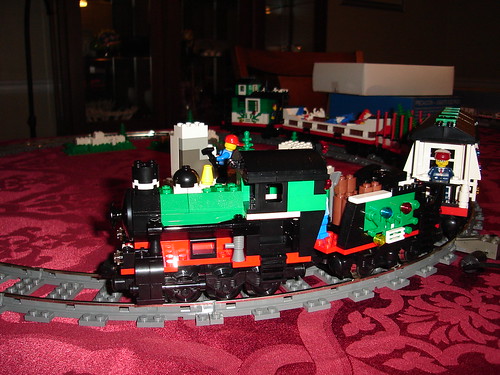While this set of reviews may seem late, it is actually right on time. The previous set was early.
-----
Spin - Robert Charles WilsonThis book won a Hugo this year. The plot goes like this: one night, a mysterious force field that blocks out all the light from the stars or the moon surrounds the Earth. The next day, it turns out it blocks the sun, too, and an artificial sun has replaced the real one. What has really happened is the Earth has been sealed into some sort of time warp, and the planet and its inhabitants are speeding rapidly forward into time relative to the universe around them. Time is limited, however: in only a few dozen years Earth time, the dying sun will destroy the planet. It's a set up I've never read before. The story is about the relationship between a driven father and son, and between them and a family friend and hanger-on, and how they and everyone else deal with the coming apocalypse. It's not bad, but I didn't really get into it except as far as wanting to find out what the heck was going on. I thought the ending felt tacked on. Not really recommended, but I'm still going to try reading some of Wilson's other books.
We - Yevgeny Zamyatin (1921)This is an old one by a Russian author (and naval engineer), who first supported the October Revolution but then quickly became disillusioned with Bolshevism. The story is written as the diary of D-503, a member of the ultimate communist society with no property, no privacy, and complete separation from the environment. He is a mathematician tasked with building a giant rocket ship so they can export their society to other planets. The main focus of this dystopian vision is the dehumanization of totalitarianism. D-503, in pursuit of a vexing and mysterious love interest, attempts to circumvent a plot by the leaders to remove the last vestiges of humanity that his fellows have. It's a significant work, because it anticipates both Brave New World and Nineteen Eighty-Four (in different ways). It was a bit of chore to read, but at least it was kind of different from a lot of the more modern stuff I've read.
Erewhon - Samuel Butler (1872) (ebook)
Here's another even older one, also about a dystopic society. This time, a European visitor stumbles upon Erewhon, a society hidden up in the mountains of some unspecified continent. The story itself is short - the visitor falls in love with a native, gets in trouble with authorities when his novelty begins to fade, and attempts his escape. The book is much longer than the actual plot, because the narrator spends a lot of time explaining the peculiar conventions of Erewhon, which are obvious satires of important European beliefs. This gets very tedious because the book, written as a memoir, reads like anthropology instead of a story. It took me a long time to finish this one because I wasn't enjoying it at all. Maybe I missed something?
The Ghost Brigades - John ScalziThe first scene in the novel hooks you. The book itself was fast paced and interesting, and I finished the rest in just a couple of days (I was really into it). For stuff that's meatier than the action scenes, he touches on some cool ideas about cloning and conscience. In retrospect, however, it seems less impressive. I should temper that by saying that it's military science fiction, which I don't usually read or enjoy. The last mil sf for me was a re-reading of Heinlein's
Starship Troopers a few years ago after watching the movie on TV. ('Was the book really like that?' I wondered. For the most part, yes it was). Scalzi doesn't get near Heinlein's fascism, and the book's politics (such as they are) didn't rile me. Looking at the reviews above, it's probably me that's in a slump. Anyway, if you are in the mood for some intelligent, action-oriented science fiction, this book is probably a pretty good choice.
It His previous book, Old Man's War, was nominated for a Hugo, but lost to
Spin.
[I knew this - I even looked it up to make sure before posting, but then I screwed it up anyway...]"The Call Of Cthulhu" - H. P. Lovecraft (1926) (ebook)
"The Dunwich Horror" - H. P. Lovecraft (1928) (ebook)
Here are two classic Lovecraft horror stories. There are probably a number of volumes where you could find these in print. I hadn't actually read any Lovecraft since the early 90s, and after reading some of Stross' latest stuff I thought I read some more. These are actually very good horror, although there is little gore or violence to work you up. You have to let yourself get into to the scene, and imagine actually coming face to tentacle with an incomprehensible, otherworldly whatever. Pretty fun and short, so download a few and read them before bedtime.
The Fourth Turning - William Strauss and Neil HoweThe first quarter of this book is junk. It's a review of moldy pseudoscience about theories of four - four humours, four elements, four seasons, four temperaments, four phases of life. It has little or nothing to do with the central premise that there is a four generation cycle of behavior in Angle-American society - all you have to do to justify the length of this cycle to me is to point out that the normal death from old age occurs about four generations after birth. After the authors finish with the above nonsense, they get into actually detailing the different cycles, and the subsections of each. There have been seven cycles since the 1400s, and each cycle has four subsections called Turnings, each corresponding to a particular constellation of generations. There are four kinds of generations and they always appear in the same order (except for once!): Hero, Artist, Prophet, and Nomad. There are therefore four Turnings: High, Awakening, Unraveling, and Crisis. The social environment (constellation of generations) determines the values and behavior of each new generation, which influences the future generations, so the cycles keep rolling. The theory is not deterministic - it does not predict what events will happen - it only tries to predict how Americans will respond to events that inevitably occur. This makes a lot of intuitive sense to me and the authors present a lot of evidence to back up their assertions. However, I have not looked for criticisms of their work or know enough about the history of social movements to say whether there is substantial counter evidence. The book was written in 1997, and it is interesting to read how the authors feel the Silent (b. 1925-1942, Artist), Boom (b. 1943-1960, Prophet), Thirteenth (b. 1961-1981, Nomad), and Millennial (b. 1982-200?, Hero) generations would develop over the next decade (that is, the last decade from where we sit), before the Crisis catalyst arrived somewhere around 2005. To me, it seems like they miss the mark. Maybe I don't have a good grasp of what's really going on outside my own experience, maybe they were wrong, or maybe the Crisis started earlier than they expected (say, September 2001). Missed predictions aside, they seem to get a lot of the general feeling of American society right. All in all, interesting to think about.











